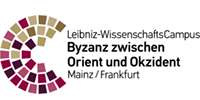Leibniz ScienceCampus – Byzantium between Orient and Occident – Mainz/Frankfurt
Focus Area
The Byzantine Empire played a vital role in the formation of modern Europe and the Middle East. Between the 4th and the 12th century, it was the leading culture that set standards in all areas of life and that had a key influence on all neighbouring states. Byzantium formed a bridge between Antiquity and the Modern Age and, at the same time, between Europe and the Orient. The Byzantine heritage is still present today in many countries in the form of the Orthodox Church. Despite its historical significance, research into Byzantine history and culture in Germany occupies a niche area, although the Byzantine element is gaining a new importance against the background of the European unification process.
Objective
The Mainz/Frankfurt ScienceCampus aims to establish a broad platform for interdisciplinary Byzantine studies within an institutional framework. It comprises representatives from several fields, including Byzantine studies, Christian archaeology and Byzantine art history, as well as all disciplines that contribute to research into the Byzantine Empire and its culture. The Mainz/Frankfurt ScienceCampus promotes the integration of dispersed scientific disciplines dedicated to Byzantium. It brings together thematic, multidisciplinary, historical and cultural research under one roof and, by presenting Byzantine studies as a whole, aims to improve the visibility of this scientific field.
Concept
The ScienceCampus is an initiative of the Leibniz Association that aims to establish closer links between research carried out at universities and non-university research institutions. Under the umbrella of the campus, the partnership is to bundle excellence, carry out strategic research, foster interdisciplinary thinking and strengthen the research profile of the location.












